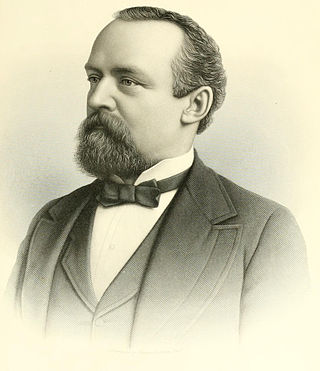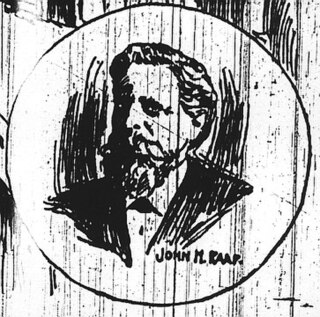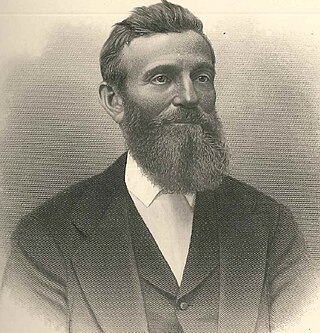
William Augustus Barstow was an American businessman, politician, and public administrator. He was the third governor and second Secretary of State of Wisconsin, and served as a Union Army officer during the American Civil War. Before Wisconsin became a state, he was instrumental in the creation of Waukesha County.

Sleeman Breweries is a Japanese-owned Canadian brewery founded by John Warren Sleeman in 1988 in Guelph, Ontario. The company is the third-largest brewing company in Canada. Along with its own Sleeman brands, the company produces under licence the Stroh's family of brands, Maclays Ale and Sapporo Premium beers for sale in Canada. The company's parent Sapporo owns 4.2 per cent of Ontario's primary beer retailer The Beer Store.

RHM plc, formerly Rank Hovis McDougall, was a United Kingdom food business. The company owned numerous brands, particularly for flour, where its core business started, and for consumer food products. It was listed on the London Stock Exchange and was once a constituent of the FTSE 100 Index but was acquired by Premier Foods in March 2007; many of its brands continue to be produced.

Charles Alfred Pillsbury was an American businessman, flour industrialist, and politician. He was a co-founder of the Pillsbury Company.
Holmesville is a hamlet in Chenango County, New York, United States. It is situated on the Unadilla River, in the south-east corner of the town of New Berlin.

Minneapolis is the largest city by population in the U.S. state of Minnesota, and the county seat of Hennepin County. The origin and growth of the city was spurred by the proximity of Fort Snelling, the first major United States military presence in the area, and by its location on Saint Anthony Falls, which provided power for sawmills and flour mills.
Charles James Kershaw was a businessman born in Burnley, Lancashire, England, in 1832. He came to America in 1841, and received his education at the Derby Line Academy, in Derby Line, Orleans County, Vermont. He came West in 1853, and engaged in a general trade in provisions, grain and flour, both in Milwaukee and Chicago, and made Milwaukee his permanent home in 1861. He died while visiting family members in Tacoma, Washington, in May 1910.

The Upper Peninsula Brewing Company Building is an office building located at the intersection of Meeske Street and US 41 in Marquette, Michigan. It is also known as the Charles Meeske House. The structure served as the home and office of brewer Charles Meeske, secretary-treasurer and later president of the company. It was listed on the National Register of Historic Places in 1980.

John Henry Raap was an entrepreneur and wholesale liquor retailer in Chicago in the 19th century.

Edward Phelps Allis was an American businessman who founded the Edward P. Allis Company, a manufacturer of milling and mining equipment, steam engines, and other large-scale capital equipment. He was a notable ideologue in the Greenback Movement, running for governor of Wisconsin as a candidate of the Greenback Party. About a decade after his death, his company merged with others to form the Allis-Chalmers Manufacturing Company. In 1883, Allis was elected a fellow of the American Society of Civil Engineers.

John Stevens was a miller and inventor who lived in Neenah, Wisconsin. His inventions in flour milling revolutionized the process, leading to large-scale shifts in wheat-growing regions, and to the predominance of particular milling companies and mill-equipment manufacturers. Today Patent flour is still referred to due to Stevens' patents.

Winchel Dailey Bacon was an American farmer, abolitionist activist, and Wisconsin pioneer. He was a prominent Baptist layman in Waukesha, Wisconsin, and represented Waukesha for one term in the Wisconsin State Assembly.
Joseph Bond was a pioneer settler of what became Waukesha County in the Wisconsin Territory, and an active Democratic politician, serving in the territorial legislature and later in the Wisconsin State Assembly as well as holding local offices.

Jacob Friedrich Schoellkopf was a pioneer in harnessing the hydroelectric power of Niagara Falls.

Charles Augustus Otis, Sr. was a businessman and the mayor of Cleveland from 1873 until 1874.

Havilah Babcock was an American manufacturing executive and a joint founder of the Kimberly-Clark Corporation.
John Sargent Pillsbury Sr. was an American businessman and industrialist known for his role as CEO at Pillsbury Company. His father was Charles Alfred Pillsbury co-founder of Pillsbury Company with his uncle John S. Pillsbury after which John himself was named. John's father had served in the Minnesota State Senate and his great uncle had served as governor of Minnesota from January 7, 1876, to January 10, 1882. It was for this reason that John had wanted to pursue a career in politics upon graduating from the University of Minnesota. He had also planned to go to France at the turn of the century to study international law and the French language.

Delos L. Filer was a businessman involved in developing Manistee County and the towns of Manistee, Filer City and Ludington in the state of Michigan. He owned sawmills and related businesses.

Gadow's Mill is a former grist mill on the Milwaukee River in West Bend, Wisconsin, United States, that is listed on the National Register of Historic Places (NRHP).
George Clinton Pratt was an American farmer, Democratic politician, and Wisconsin pioneer. He was a member of the Wisconsin Senate, representing Waukesha County during the 1862 and 1863 sessions.













